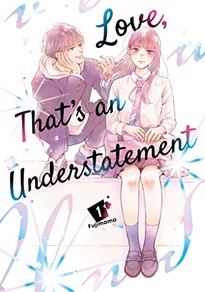Review
by Rebecca Silverman,Love, That's an Understatement
GN 1
| Synopsis: |  |
||
High school student Risa is always prepared – for everything. Her heavy bag is stuffed with anything she could possibly need during the day, and that's a good thing for Zen. When Risa spots the boy from a “dangerous” high school sitting under a tree in the rain after a fight, she cleans him up, hands him an umbrella, and gives him the address of a hospital. Zen falls for her immediately and begins trying to get her to feel the same way, but there are complications, both with his reputation and her past, that might be getting in the way. Love, That's an Understatement is translated by Haruko Hashimoto and lettered by Lys Blakeslee. |
|||
| Review: | |||
The good girl/bad boy romance trope is almost as old as the romance genre itself. Early versions of the trope, such as in Samuel Richardson's 1748 novel Clarissa, didn't exactly work out. However, we're largely past those days, as well as those of the rebels without a cause or a clue. That's good news for Love, That's an Understatement, creator Fujimomo's second title to receive an English translation. Although the story's nothing new, it's enjoyable and very easy to get invested in characters like Risa and Zen as we learn more about them. The two have a meeting that Zen likes to think of as “fated.” Zen, the leader of one of two rival groups at his all-boys high school, has been beaten within an inch of his vision, if not his life, and is languishing beneath a tree in the rain. Passersby are aware of him but too frightened to offer him help, lest the thugs who beat him up come after them. Walking by on her way to cram school, Risa is the only person who stops. She pulls out a first aid kit and an extra umbrella from her bag, patches him up, and then hands him the address of the nearest hospital ER. For her, it's further proof of why she should always be prepared. For him—it's a meeting with destiny. One of the story's strengths is how well Risa's character is depicted. I do mean that in two senses; if I didn't know that this was by the same artist as Lovesick Ellie, I wouldn't necessarily have recognized the art style. Whether this is Fujimomo deliberately doing something different or just a natural evolution of style isn't clear. Secondly, her personality is also very well portrayed. It takes time for us to understand why she feels the need to carry around a heavy bag no matter what, and the information is doled out naturally. Risa is a reticent person, and she's not going to spill her secrets to Zen just because he asks her. Even then, we as readers get more of the real story than he does; there's a distinct impression that she's uncomfortable opening up to anyone. We learn most of the details about her from careful observation of the book's details. For example, she living with a single mom and feels a lot of pressure simply based on her family situation. One of the best details in the volume is when Zen and Risa exchange contact info: Zen gives Risa his Line ID, but Risa gives him her phone number, implying that she doesn't use social media, nor does she have enough people she wants to message to bother with an app like Line. Nothing is said about it, but the information is there for us to pick up on. Other details, like that one friend of Zen's we only see in profile or from the back, are fun, though not necessarily on the same level; still, looking for these little things makes reading particularly engaging. In terms of the plot, we get a very good feel for how hard Zen tries with Risa. There's the usual, like protecting her from his rivals, who are genuinely menacing at times, or showing up on his motorcycle to pick her up from cram school. But underneath all of it, there is a clear desire to help and a sense that he truly likes her for who she is. For example, when Risa makes a big deal about not picking up a stray kitten that one of Zen's friends found and comes across as cold-hearted and possibly even anti-kitten, Zen doesn't take the situation at face value. He figures out that Risa simply doesn't know how to show care or be vulnerable in front of others. Ultimately, he helps her rescue the grumpy little kitty no fewer than three times. Zen is invested in getting to know Risa, and while he doesn't always act in the best way – surprise kissing isn't awesome – he comes across as someone who cares. The story moves along at a good clip between Risa's reticence and Zen's outgoing personality. It manages to do so while still allowing us to get to know both characters and understand their struggles; it is a smooth read. Risa seems to want to be able to open up to others, but something is holding her back. Her crippling need to appear prepared and perfect at all times is also a problem she is partially aware of. Although we know less about Zen's background, it doesn't seem like a major problem for now: volume two may expand on that situation at his school. Love, That's an Understatement's first volume is a strong start to an enjoyable take on the good girl/bad boy romance subgenre. If you're a fan of shoujo-style romance, you definitely ought to check it out. |
| Grade: | |||
|
Overall : B+
Story : B+
Art : A-
+ Great details in the art and story, Zen and Risa are understandable and work well as the lead couple. |
|||
| Production Info: | ||
|
Full encyclopedia details about |
||